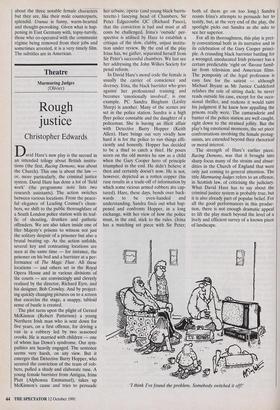Theatre
Murmuring Judges (Olivier)
Rough justice
Christopher Edwards
David Hare's new play is the second in an intended trilogy about British institu- tions (the first, Racing Demons, was about the Church). This one is about the law or, more particularly, the criminal justice system. David Hare has done a lot of 'field work' (the programme note lists two research assistants). The action switches between various locations. From the peace- ful elegance of Leading Counsel's cham- bers, we shift to the public thoroughfare of a South London police station with its traf- fic of shouting, drunken and pathetic offenders. We are also taken inside one of Her Majesty's prisons to witness not just the solitary despair of a prisoner but also a brutal beating up. As the action unfolds, several key and contrasting locations are seen at the same time — for instance, the prisoner on his bed and a barrister at a per- formance of The Magic Flute. All these locations — and others set in the Royal Opera House and in various divisions of the courts — are convincingly and cleverly realised by the director, Richard Eyre, and his designer, Bob Crowley. And by project- ing quickly changing pictures on to a screen that encircles the stage, a snappy, tabloid sense of bustle is created.
The plot turns upon the plight of Gerard McKinnon (Robert Patterson) a young Northern Irish man who is sent down for five years, on a first offence, for driving a van in a robbery led by two seasoned crooks. He is married with children — one of whom has Down's syndrome. Our sym- pathies are heavily engaged. The sentence seems very harsh, on any view. But it emerges that Detective Barry Hopper, who secured the conviction of the team of rob- bers, pulled a shady and elaborate ruse. A young female barrister from Antigua, Irina Platt (Alphonsia Emmanuel), takes up McKinnon's cause and tries to persuade
her urbane, opera- (and young black barris- terette-) fancying head of Chambers, Sir Peter Edgecombe QC (Richard Pasco), that the conviction is bad and must at all costs be challenged. Irina's 'outside' per- spective is utilised by Hare to establish a critique of the slow, clubby, unjust institu- tion under review. By the end of the play Irina has, we gather, separated herself from Sir Peter's successful chambers. We last see her addressing the John Wilkes Society for penal reform.
In David Hare's moral code the female is usually the carrier of conscience and decency. Irina, the black barrister who goes against her professional training and becomes 'emotionally involved', is one example. PC Sandra Bingham (Lesley Sharp) is another. Many of the scenes are set in the police station. Sandra is a high flyer police constable and the daughter of a policeman. She is having an illicit affair with Detective Barry Hopper (Keith Allen). Hare brings out very vividly how hard it is for the police to run things effi- ciently and honestly. Hopper has decided to be a thief to catch a thief. He pours scorn on the old movies he saw as a child when the Gary Cooper hero of principle triumphed in the end. He didn't believe it then and certainly doesn't now. He is not, however, depicted as a rotten copper (his ruse results in a trade-off of information by which some vicious armed robbers gre cap- tured). Hare, these days, bends over back- wards to be even-handed and understanding. Sandra finds out what hap- pened and confronts Hopper, in a long exchange, with her view of how the police must, in the end, stick to the rules. (Irina has a matching set piece with Sir Peter; both of them go on too long.) Sandra resists Irina's attempts to persuade her to testify, but, at the very end of the play, the spotlight picks out Sandra as she asks to see her superior.
For all its thoroughness, this play is pret- ty conventional both in its narrative and in its celebration of the Gary Cooper princi- ple. A crusading black barrister battling for a wronged, uneducated Irish prisoner has a certain predictable 'right on' flavour famil- iar from television and American films. The pomposity of the legal profession is easy fare for the satirist — although Michael Bryant as Mr Justice Cuddeford relishes the role of sitting duck; he never reads outside his case, except for the occa- sional thriller, and reckons it would taint his judgment if he knew how appalling the prisons really were. The camaraderie and banter of the police station are well caught, right down to the strained jollity. But the play's big emotional moments, the set piece confrontations involving the female protag- onists, are extended beyond their rhetorical or moral interest.
The strength of Hare's earlier piece, Racing Demons, was that it brought into sharp focus many of the strains and absur- dities in the Church of England that were only just coming to general attention. The title Murmuring Judges refers to an offence, in Scottish law, of criticising the judiciary. What David Hare has to say about the criminal justice system is probably true, but it is also already part of popular belief. For all the good performances in this produc- tion, there is not enough dramatic appeal to lift the play much beyond the level of a lively and efficient survey of a known piece of landscape.
'I think I've found the problem. Somebody switched it off!'


























































 Previous page
Previous page